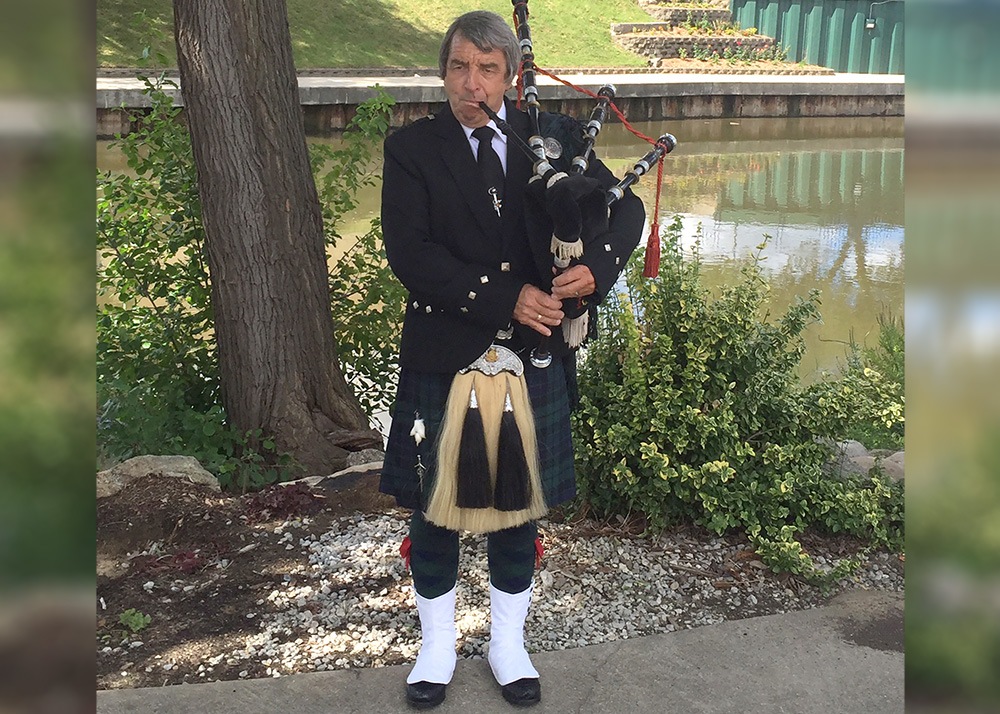
Illness brought pain and loss to Clifford MacKay and those around him. He found positivity to be the best prescription for the situation.
“What’s my alternative?” Cliff asked. “I could mope and complain. But that isn’t going to fix anything. I’ve got what I have got and I’m just going to deal with it the best I can. It’s not like somebody picked on me. That’s life. You are going to die from it if you don’t start living with it.”
Cliff’s grandfather and father died of colorectal cancer. His younger brother is a colorectal cancer survivor. Cliff knew he could not avoid fate. The condition affecting the MacKays is Familial Adenomatous Polyposis (FAP).
It is an inherited disorder in which many polyps (usually hundreds to thousands) form on the inner walls of the colon and rectum. Polyps are abnormal growths that may become cancer if they are not removed. People with FAP have a very high risk of developing colorectal cancer at an early age and are also at risk for developing other cancers.
Thirty-five years ago, FAP caught up with Cliff. He was not living in the area at the time. Most of his large intestine was removed, but not all of it. Because he still had a small portion of his large intestine remaining, a colostomy or ileostomy - a bowel diversion procedure in which a pouch or bag is attached to the abdomen to collect waste - was not needed.
“I was a lucky duck,” he said. “The only criteria I had at that point was I said, ‘Don’t stick a bag on me, I don’t think I can handle that.’ “The first words I heard coming out of surgery were, ‘Good news. No bag. We got it all. You are good to go.’ “I was a normal person who lived a pretty much normal life for 35 years.”
Cliff went on to marry Karalee and recently settled in Kahoka, MO, after living in a number of places across the country and Canada.
Fast forward to age 68 and FAP caught up with Cliff a second time. Abdominal pain and bleeding led him to his primary care provider, Brigitte Cormier, DO, at Blessing Health’s Kahoka Medical Clinic. Dr. Cormier referred Cliff to Blessing Health gastroenterologist, Dr. Daniel Moore, for a colonoscopy. That test led to the diagnosis of rectal cancer in the small portion of Cliff’s colon remaining. The diagnosis led to a referral to Blessing Health’s colon and rectal surgeon, Harsha Polavarapu, MD – Dr. Harsha to his patients – for treatment.
Once again, FAP had caught up with Cliff. Again he answered with positivity, as did Dr. Harsha.
“We can take care of you,” Dr. Harsha told Cliff. “This is what we do.”
To live, Cliff needed the remaining small portions of his colon removed and an ileostomy.
“As for most families, it was a shock,” Cliff’s wife Karalee said. “The great thing is Cliff is so positive. I was more of a mess than he was.”
Both Karalee and Cliff say the knowledge, skill and compassion of every Blessing caregiver with whom they came into contact through this difficult time gave them the information, confidence and peace of mind they needed.
“I was scared, of course. It’s a scary thing to learn your husband has stage three colorectal cancer. But I felt we were in such good hands. We were just so fortunate to be at Blessing. They have a great system and it was such a team effort. I can tell you from my previous experience with healthcare on the east coast, that’s not always the case.”
In addition to the doctors involved in Cliff’s care, Karalee sighted the exceptional care provided by Blessing Cancer Center navigator Diana Seals and Surgery Department nurse practitioner Lori George.
Cliff became a patient of the Blessing Cancer Center before his surgery to shrink the tumor. He received chemotherapy under the care of Daniel Koh, MD, medical oncologist, and radiation therapy under the care of Robert Johnson, MD, radiation oncologist, Then, Cliff had surgery followed by another course of radiation therapy to reduce the risk for a recurrence of cancer.
Due to the need for an ileostomy this time, Cliff now uses a bag.
“It’s not that big of a deal,” Cliff said. “I manage with it. I know there is a lot of talk, ‘Once you get a bag, it’s a horrible thing.’ It’s an inconvenience. It’s not the end of the world.”
“The other thing is, most guys will not go for a colonoscopy,” he concluded. “But you don’t feel this cancer as it is growing inside you until it is too late in the game. If I had advice for anyone it’s either get a colonoscopy or you’re going to get a bag. It’s that simple.”
For more information on Blessing Health’s colorectal cancer services and general information on the disease, go blessinghealth.org/colon.
